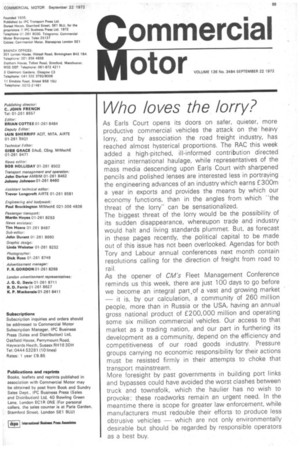Who loves the lorry?
Page 89

If you've noticed an error in this article please click here to report it so we can fix it.
As Earls Court opens its doors on safer, quieter, more productive commercial vehicles the attack on the heavy lorry, and by association the road freight industry, has reached almost hysterical proportions. The RAC this week added a high-pitched, ill-informed contribution directed against international haulage, while representatives of the mass media descending upon Earls Court with sharpened pencils and polished lenses are interested less in portraying the engineering advances of an industry which earns £300m a year in exports and provides the means by which our economy functions, than in the angles from which "the threat of the lorry" can be sensationalized.
The biggest threat of the lorry would be the possibility of its sudden disappearance, whereupon trade and industry would halt and living standards plummet. But, as forecast in these pages recently, the political capital to be made out of this issue has not been overlooked. Agendas for both Tory and Labour annual conferences next month contain resolutions calling for the direction of freight from road to rail
As the opener of CM'S Fleet Management Conference reminds us this week, there are just 100 days to go before we become an integral part.of a vast and growing market — it is, by our calculation, a community of 260 million people, more than in Russia or the USA, having an annual gross national product of £200,000 million and operating some six million commercial vehicles. Our access to that market as a trading nation, and our part in furthering its development as a community, depend on the efficiency and competitiveness of our road goods industry. Pressure groups carrying no economic responsibility for their actions must be resisted firmly in their attempts to choke that transport mainstream.
More foresight by past governments in building port links and bypasses could have avoided the worst clashes between truck and townsfolk, which the haulier has no wish to provoke; these roadworks remain an urgent need. In the meantime there is scope for greater law enforcement, while manufacturers must redouble their efforts to produce less obtrusive vehicles — which are not only environmentally desirable but should be regarded by responsible operators as a best buy.
































































































































































































































































































































































































































































































































